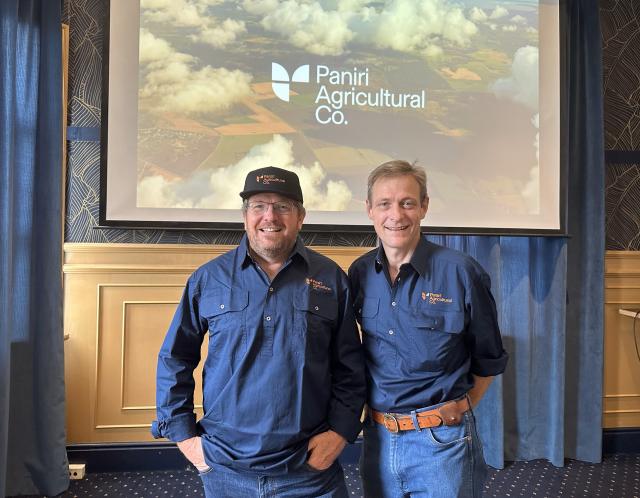
Rory Whitefield has come full circle in his 47 years of life.
Born and bred in South Africa, Mr Whitefield migrated to Australia in 2003 aged 17 and worked on large-scale stations in southwest and Far North Queensland, as well as the Northern Territory.
He then decided “for some reason” to study law at Armidale University before practising as a corporate lawyer in Brisbane for 12 years.
Now, Mr Whitefield, the chief agribusiness officer for Corporate Carbon, has been appointed the chief executive officer of Paniri Agricultural Co.
He brings 26 years of agricultural experience across cattle production, law and natural asset management.
“Oh yes, the position does provide great overlap between my background in agriculture and corporate law,” Mr Whitefield said.
“Having worked on large-scale properties from the ground up, combined with big-end-of-town legal experience, I began to research how to optimise capital gains by investing in agriculture.
“The no-brainer for me came from blending the environment and agriculture and drawing the most benefit from carbon production, as well as cattle production.
“And, of course, doing both sustainably.”
Launched in March, Paniri Agricultural Co is a dedicated natural asset management and agribusiness arm aiming to accelerate the transformation to an environmentally-driven agriculture industry.
A subsidiary of Corporate Carbon, one of Australia’s leading carbon abatement project developers and owners, Paniri’s formation follows the recent acquisition of the Holroyd aggregation of Holroyd River, Crystalvale and Yarraden cattle stations, located about 150 kilometres southwest of Coen on the Cape York Peninsula, Queensland.
This existing aggregation – in addition to Watson River station bought in September 2022 – sees a combined total of almost 522,000 hectares in the region under Paniri Agricultural Co management.
Representing more than 40 per cent of the growing portfolio, the expanding footprint in the Cape York Peninsula cements the strategic approach of the company to leverage the combination of agriculture production – starting with cattle – to complement carbon projects and to unlock growth opportunities within the industry.
Mr Whitefield said Paniri Agricultural Co would work to continue the existing cattle operations and carbon projects on both Watson River and the Holroyd River aggregation.
“Practically, we are absolutely open for agriculture, with a ‘no lock the gate’ approach,” he said.
“For example, we might walk cattle down a fence line to reduce the fuel load or we might do a different grading plan across the property to ensure our cattle can walk towards water.
“Our day-to-day operations are based around carbon and how we best use that within our management program to maximise agricultural production.
“Farmers are very much at the forefront of a best practice, environmental approach. So that’s all we’re doing, no different to many other farmers. It’s just that we’re running a carbon project at the same time as a cattle project.”
According to Mr Whitefield, Paniri Agricultural Co assumes a local-first approach across its operations.
It seeks first to retain existing staff, contractors and suppliers and to work with local communities through employment and economic opportunities for local business and industry.
“The regeneration and protection of the natural environment is also a major priority for us, including proactively managing invasive pests and weeds to enhance our ecosystems,” Mr Whitefield said.
As a now significant landowner in the region, Paniri Agricultural Co also recognises the responsibility it has to the land and takes a long-term view in the transformation of its broader portfolio of 1.3 million hectares to sustainable agriculture.





